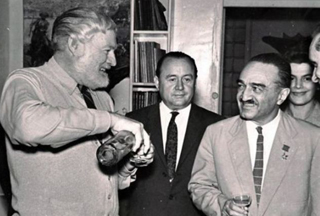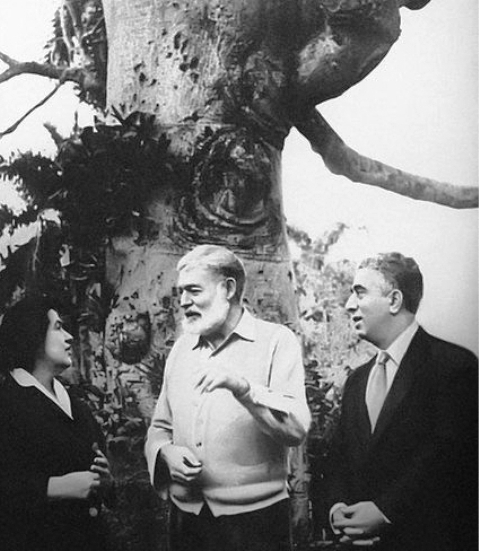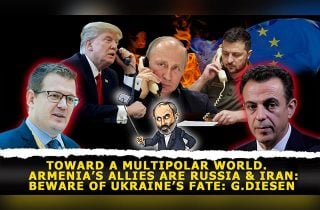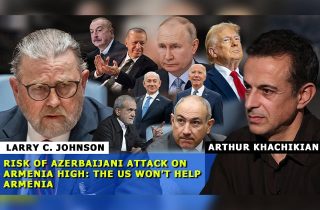Khachatryan and Hemingway – single meeting

After the Cuban revolution the Armenian renowned composer Aram Khachatryan was among the first, who toured to the Liberty Island with a small soviet delegation. The political context was very obvious in this tour but not for him. In February 1960 Khachatryan presented his second symphony. He was also the leader of the group. The success of the performance was immense. The audience welcomed the Armenian composer with applause and among the notes received from the spectators there was this one, “You have done two miracles. The first was your symphony and the second was what you did with the orchestra.”
The author of the note was the world famous American writer Ernest Hemingway’s wife Mary Welsh. This note should have been double pleasant for the composer. But the most pleasant thing was waiting – the meeting of the two renowned artists. We may assume that the meeting took place with the initiative of Mary. This version is also confirmed by a soviet politician Anastas Mikoyan’s son Sergo, who was also in Cuba on those days.
He writes in his memoirs, “Among the presents we have also taken a bottle of Russian vodka to Hemingway. And we were surprised to see exactly the same bottle of vodka open on his table.” “A few days ago I found out that famous composer Khachatryan is in Havana. We invited him to have dinner with us. We had an interesting conversation at the dinner table. We liked him and his wife very much. I like his music.
Khachatryan left me this bottle,” said Hemingway. One of the witnesses of this meeting was the representative of the soviet in relations with other states Vladimir Kuzmishev. On those years the American writer used to live in Havana – in La Vihia mansion. Here he would receive thousands of admirers, who would visit from different corners of the world. Khachatryan’s reception was more than warm. In the beginning, according to American traditions, the hosts of the party showed him their three-story mansion. In his memoirs Kuzmishev tells, “Khachatryan was a very modest man and he realized that the owner of La Vihia mansion adores his music.” But this wasn’t all. It turns out that Hemingway had a record of Khachatryan’s pieces. He had over 15 records and stereo tapes.
“Hemingway literally shocked Aram Ilich when he showed his records and told him, “These are your records, maestro.” -Why were they there? Asked Khachatryan in a confusion. Everyone besides the composer laughed. And he continued pondering and asked two or three times. “What’s so funny here? Why are you laughing?” One should have known the modesty and naivety of Khachatryan to know that he was seriously shocked to see his records in the library of a Nobel prize winner Ernest Hemingway, who would consider him a maestro. There is another evidence about the meeting of the two renowned people. It was provided by a famous writer Sergey Dovlatov. He writes in one of his pieces, “Khachatryan came to Cuba, met Hemingway. Khachatryan said something in English. Then Hemingway asked whether he spoke English.” – A little, responded Khachatryan. “Just like we all here,” replied Hemingway.
The knowledge of English didn’t cause any complications in their communication. According to the eyewitnesses, during the dinner they were speaking about art, culture, literature, Cuba, Russia, Spain – eternal love of Hemingway. They had similar opinions regarding various matters. And it was no surprise because both of them cared very much about human values, which don’t have any limits for politics and time. As a memory from their first meeting they were photographed in the background of seiba tree that grows in the yard of the mansion. During the farewell, the hosts relied on Cuban traditions when the men shake hands for a long time and women embrace each other.
They say that a month later Hemingway received another delegation from the soviet and Hemingway treated them the brandy presented by Khachatryan and told them that it was from Yerevan. It is hard to believe that a year after this meeting an agile person like Hemingway would commit a suicide.
By Hovik Charkhchyan


























